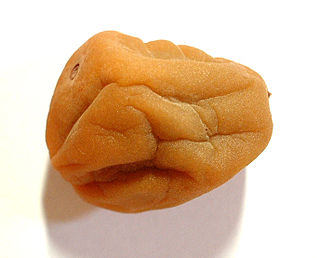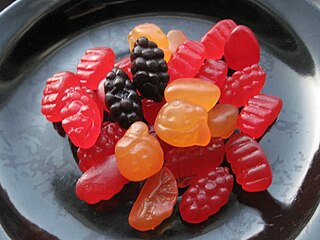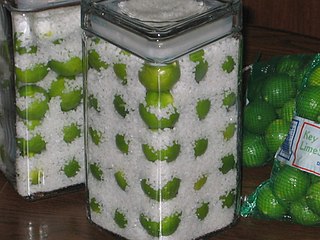
Calamansi, also known as calamondin, Philippine lime, or Philippine lemon, is a citrus hybrid cultivated predominantly in the Philippines. It is native to the Philippines, parts of Indonesia, Malaysia, and Brunei, as well as parts of southern China and Taiwan.

An apricot is a fruit, or the tree that bears the fruit, of several species in the genus Prunus.

Prunus is a genus of flowering trees and shrubs from the family Rosaceae, which includes plums, cherries, peaches, nectarines, apricots and almonds. The genus has a cosmopolitan distribution, being native to the temperate regions of North America, the neotropics of South America, and temperate and tropical regions of Eurasia and Africa, There are about 340 accepted species as of March 2024.
Schnapps or schnaps is a type of alcoholic beverage that may take several forms, including distilled fruit brandies, herbal liqueurs, infusions, and "flavored liqueurs" made by adding fruit syrups, spices, or artificial flavorings to neutral grain spirits.

Umeboshi are pickled (brined) ume fruits common in Japan. The word umeboshi is often translated into English as 'salted Japanese plums', 'Japanese plums' or 'preserved plums'. Ume is a species of fruit-bearing tree in the genus Prunus, which is often called a "plum", but is actually more closely related to the apricot. Pickled ume which are not dried are called umezuke (梅漬け).

Anthony Marc Shalhoub is an American actor. His breakout role was as Antonio Scarpacci on the sitcom Wings from 1991 to 1997. He later starred as Adrian Monk in the USA Network series Monk from 2002 to 2009, winning three Primetime Emmy Awards for Outstanding Lead Actor in a Comedy Series as well as the Golden Globe Award for Best Actor in a Comedy Series. For his supporting role as Abe Weissman on Amazon's The Marvelous Mrs. Maisel, he won the Primetime Emmy Award for Outstanding Supporting Actor in a Comedy Series.

Starburst is the brand name of a box-shaped, fruit-flavoured soft taffy candy manufactured by The Wrigley Company, which is a subsidiary of Mars, Incorporated. Starburst has many different varieties, such as Tropical, Sour, FaveREDs, Watermelon, Very Berry, Superfruit, Summer Blast and Original.

Pálinka is a traditional fruit spirit with origins in the medieval Hungary, known under several names. Protected as a geographical indication of the European Union, only fruit spirits mashed, distilled, matured and bottled in Hungary and similar apricot spirits from four provinces of Austria can be called "pálinka", while "Tótpálinka" refers to wheat-derived beverages. Törkölypálinka, a different product in the legal sense, is a similarly protected pomace spirit that is commonly included with pálinka. While pálinka may be made of any locally grown fruit, the most common ones are plums, apricots, apples, pears, and cherries.

Plum sauce is a viscous, light-brown sweet and sour condiment. It is used in Cantonese cuisine as a dip for deep-fried dishes, such as spring rolls, noodles, deep-fried chicken balls and roast duck. It is made from sweet plums or other fruit such as peach, pineapple or apricot, along with sugar, vinegar, salt, ginger and chili peppers.

Fruit Roll-Ups is a brand of snack that debuted in grocery stores across America in 1983. It is a flat, corn syrup-based, fruit-flavored snack rolled into a tube, spread on a backing sheet of cellophane to prevent the product from sticking to itself.

A fruit snack is a type of gummy snack made with fruit flavoring and natural gelatin. They were first made by confectioner Louis Shalhoub in the 1970s as a lightweight high energy snack food for backpackers. Although they are often marketed as a healthier alternative to regular gummy candies, the veracity of these claims is disputed, as fruit snacks typically contain fruit flavoring instead of actual fruit.
Armenian cuisine includes the foods and cooking techniques of the Armenian people and traditional Armenian foods and drinks. The cuisine reflects the history and geography where Armenians have lived and where Armenian empires existed. The cuisine also reflects the traditional crops and animals grown and raised in Armenian-populated or controlled areas.

Chamoy is a variety of savory sauces and condiments in Mexican cuisine made from pickled fruit. Chamoy may range from a liquid to a paste consistency, and typically its flavor is salty, sweet, sour, and spiced with chilies.

The poppy seed roll is a pastry consisting of a roll of sweet yeast bread with a dense, rich, bittersweet filling of poppy seed. An alternative filling is a paste of minced walnuts, or minced chestnuts.

Stride is a brand of sugar-free chewing gum introduced in 2006 and owned by Mondelez International, sold in packs of 14 pieces. The company sold most of its chewing gum brands to Perfetti Van Melle in 2023, which did not include the sale of Stride, to focus on other confections. In 2024, Mondelez discontinued sales of Stride in the United States, Canada, and Europe, but it is still sold in China and Australia.

Pickled fruit refers to fruit that has been pickled. Pickling is the process of food preservation by either anaerobic fermentation in brine or immersion in vinegar. Many types of fruit are pickled. Some examples include peaches, apples, crabapples, pears, plums, grapes, currants, tomatoes and olives. Vinegar may also be prepared from fruit, such as apple cider vinegar.

Ashkenazi Jewish cuisine is an assortment of cooking traditions that was developed by the Ashkenazi Jews of Central, Eastern, Northwestern and Northern Europe, and their descendants, particularly in the United States and other Western countries.















